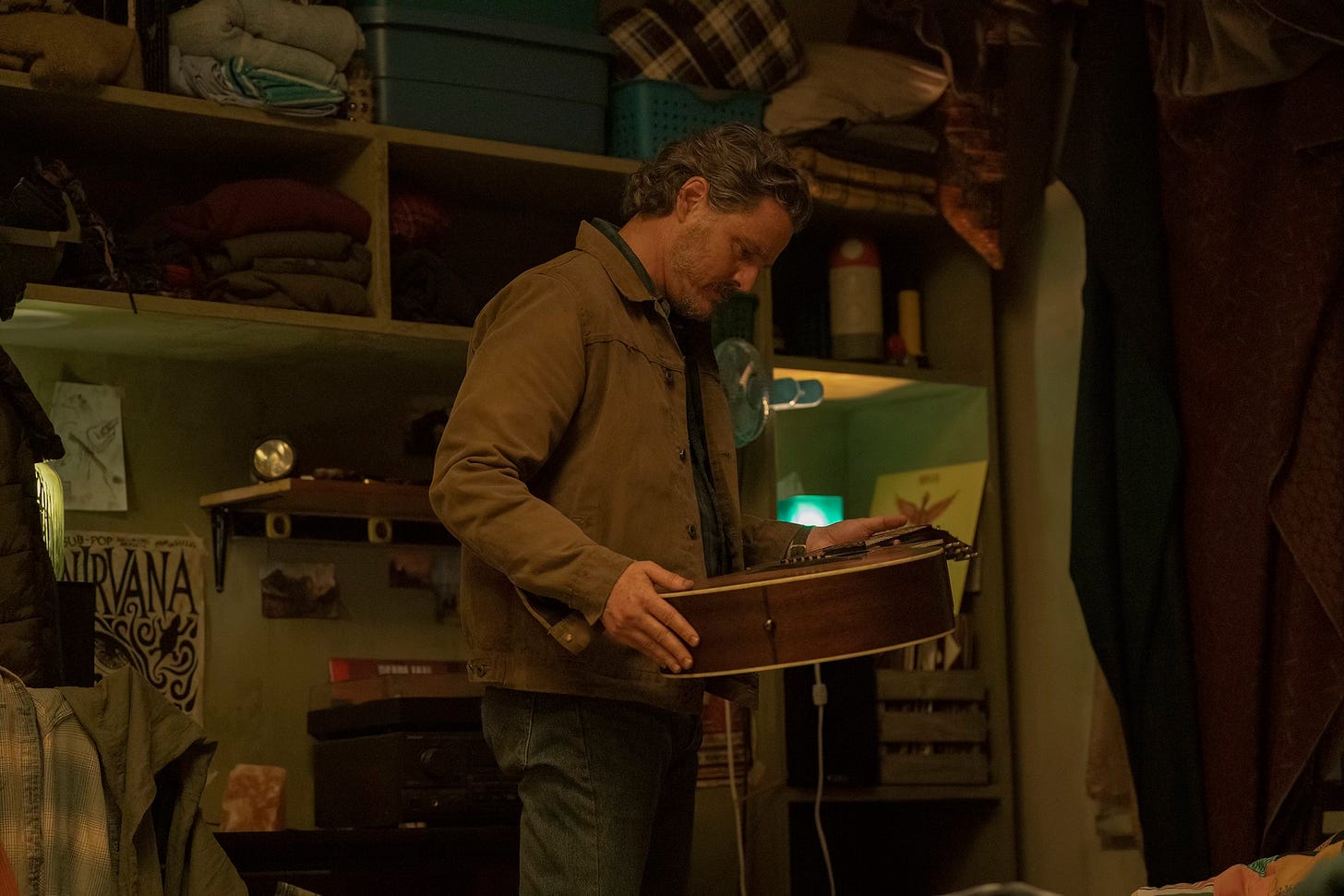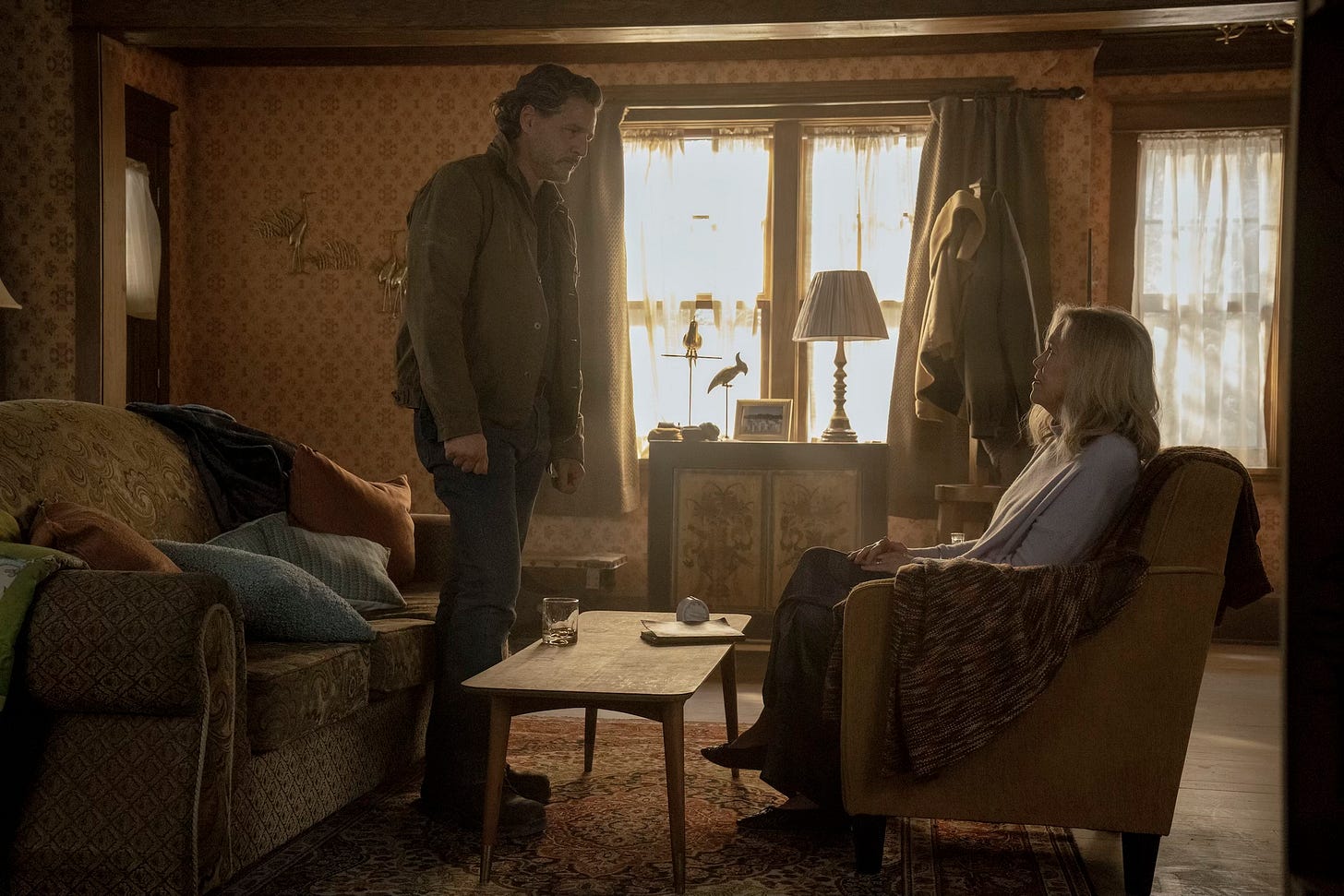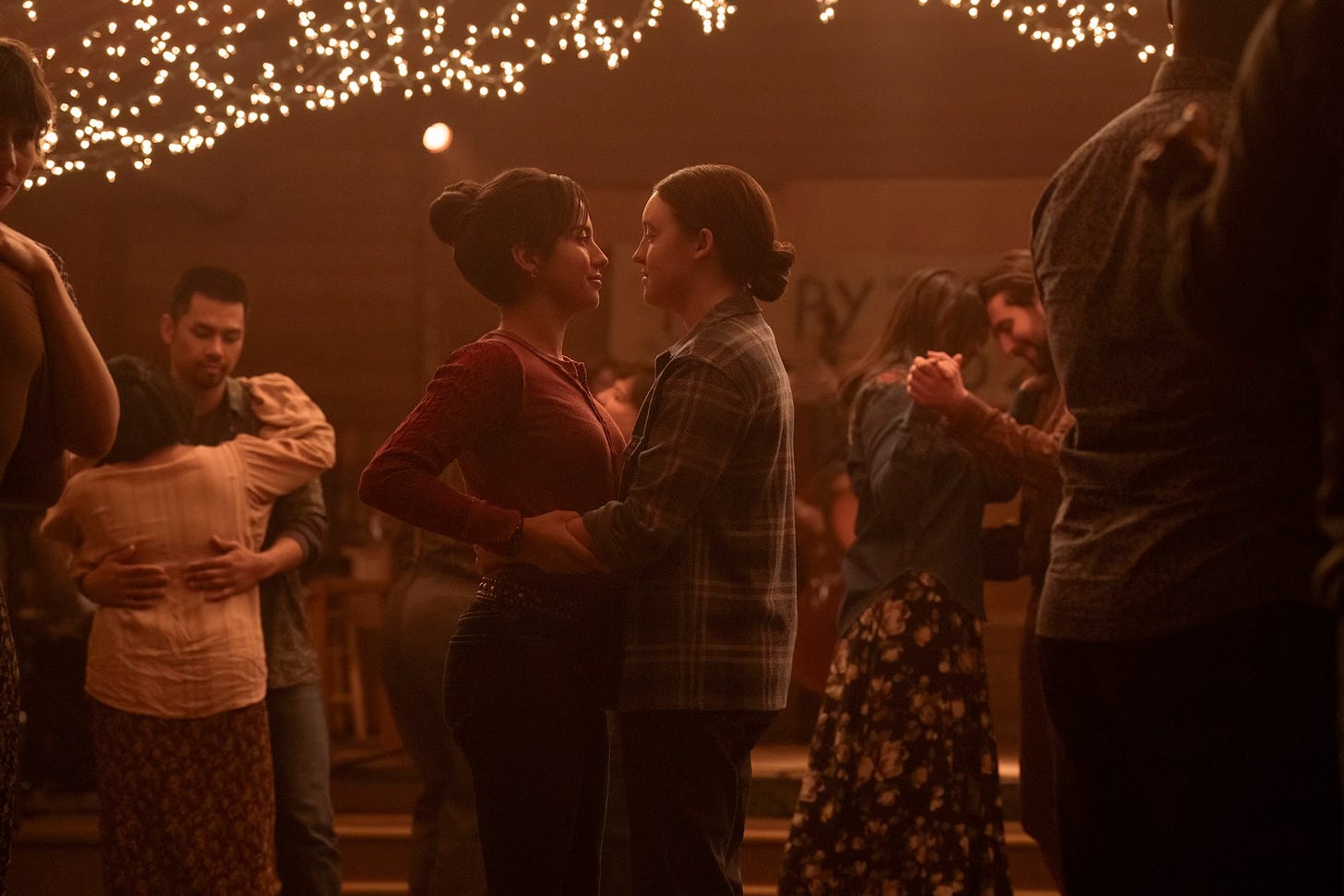The Last of Us S2E01 Review | “Future Days”
The second season of the HBO series begins with the hatred you can’t let go of.

[This review contains spoilers for Season 2, Episode 1 of The Last of Us, “Future Days.” It does not contain spoilers for the video game The Last of Us: Part II]
The first season of HBO’s adaptation of the video game duology The Last of Us landed on the notion of how love, as necessary and vital as it is, can also be a destructive force. In the climax of the Season 1 finale, Joel (Pedro Pascal) learns that Ellie (Bella Ramsey) is a host for a cure to the zombie plague that ravaged the Earth. However, for the cure to be created, Ellie would have to die. Unable to handle such a sacrifice, especially after the loss of his teenage daughter twenty years earlier, Joel rescues an unconscious Ellie and kills any Firefly (the militia group seeking the cure) who gets in his way. On their way to Jackson to rejoin Joel’s brother Tommy (Gabriel Luna) in his community of survivors, Ellie presses Joel for the truth about her condition. He lies and says that creating a cure was impossible, and there’s a sense that this, for the moment, will be a lie agreed upon. Ellie doesn’t fully believe Joel and Joel suspects Ellie hasn’t bought his lie, but they love each other too much to acknowledge the truth.
Season two is the fallout. Season premieres, particularly for serialized shows, have a way of functioning as mission statements. Although game creator and series co-creator Neil Druckmann mentions in the “Behind the Episode” that this season is about how different perspectives shape perceptions of heroes and villains, the Season 2 premiere, “Future Days,” tells us that something else is on the mind of the showrunners. We get that immediately from the prologue where we meet a band of new characters mourning their dead outside the hospital where Joel absconded with Ellie. A young woman, Abby (Kaitlyn Dever), wants to go after Joel immediately and seek revenge for the slayings. Her friends explain to her (and any audience member who wants to nitpick) why that’s not possible, but that they will get revenge in time.
Our story then picks up five years later, and so many of the dynamics we came to expect from season one have changed. The most important is there’s now a major rift between Joel and Ellie. We don’t know if she now knows the truth of what happened at the hospital, but there’s now an iciness between this surrogate father and daughter. At the very least, we know Ellie’s suspicions have deepened as we see her, now 19 years old, in a serious sparring match, which she seems to enjoy until she learns that her friend and instructor, Jesse (Young Mazino), told her fight partner to pull his punches so that Joel wouldn’t get upset. Ellie’s entire demeanor changes, and she says with total conviction, “Don’t fucking pull your punches.”
Putting this scene directly after the one with Abby offers us a way to contrast Abby and Ellie’s pain. Abby’s pain is easy to grasp—she lost someone, and she not only wants revenge, but she wants Joel to die slowly for what he did. For Ellie, rather than this direct violence, she perceives anything resembling protection as a form of violence because of how it ties back to Joel’s lie. Abby seeks to meet violence with violence, but Abby sees that pulled punch—the absence of violence—as a similar form of harm. She’d rather take another brutal punch to the face than endure what Joel considers “protection.”

What we get from Joel and Ellie is a look at how love can bizarrely lead to hatred even when we acknowledge that hatred as irrational and unhealthy. Writer and director Craig Mazin conveys this idea elegantly in the episode’s centerpiece, a therapy scene between Joel and psychiatrist Gail (Catherine O’Hara). Joel admits to Ellie’s friend Dina (Isabela Merced) that he’s been going to therapy, but once he’s in session we see that he’s still dodging the central issue. O’Hara, with a great bit of acerbic acting, calls Joel out as boring and hiding behind belabored parenting issues that every parent faces when their kid starts trying to be their own person.
At this point, we would expect to get a confession of some kind from Joel, but Mazin flips the script and gives the confession to Gail. We learn that Gail lost her husband of forty-one years, Eugene, and Joel was the one who killed him. We can infer from what Gail says that Eugene got infected and that Joel put him down because he had no choice, but after acknowledging all the rational reasons to forgive Joel, Gail confesses that she hates him. “And looking at your face, sitting in our home, makes me so fucking angry,” she tells him. “There it is. I’ve said it. I’m ashamed, but it’s in their air, and I can’t take it back.” The scene recognizes how humans are irrational creatures, but we’re better at acknowledging our hatred and prejudices rather than pretending that we don’t have them. Sometimes the sensible thing to do is accept that we don’t make sense.
Joel then opens up a little, and while he doesn’t give Gail the full story of what happened at the hospital, he does say that Ellie doesn’t hate him because he hurt her. “I saved her,” he confesses, and that’s why we’re not going into a simple story of Abby being out for revenge. We’re in a story about all the ways we hurt each other even when we’re acting out of love. In an earlier scene, Joel notes how they can’t construct buildings fast enough in Jackson for all the incoming refugees, and how they need to take care of their own first. But then Maria (Rutina Wesley), a community leader and Tommy’s wife, reminds Joel that he was a refugee too. We can hide our desires in logic and pragmatism, but we’re still hiding, and Joel is still hiding too when he says, “I saved her.” That’s true, but it’s not the whole truth. He built a new identity around protecting Ellie in the first season, and now that identity is being challenged by Ellie not needing a protector, but someone who will be honest with her.
The rift between Joel and Ellie is contrasted nicely against the deepening bond between Ellie and Dina. The two are close friends, but Ellie, despite having plenty of bravado when it comes to fighting infected, is uneasy around the cool, confident Dina. The show wisely takes time to show how much chemistry Ramsey and Merced have, and it’s an essential bit of storytelling because it shows not only Ellie establishing a crucial bond outside of Joel, but that she may have found someone other than Joel who can make her feel safe. That’s why Ellie’s blow-up at the dance is so important: Joel’s need to play hero is now an intrusion rather than a gallant action. It’s not rational to get so angry, but again, emotions have a habit of overriding rational thought.

As fraught as things are between Joel and Ellie, we also know this is the calm before the storm. Ellie comes across an infected that can strategize and stalk its prey, implying that they’ve now evolved to become even more dangerous. The pipe that the construction team broke open has live Cordyceps, and while we don’t know what the narrative payoff will be for this reveal, the symbolism is immediately apparent when Abby and her friends appear at the outskirts overlooking Jackson. After five years they’ve found Joel, and Abby still wants revenge.
The big question this episode asks is, “What do you do with all that hatred?” Like with the infected, there is no cure for that pain. It lives inside, tears apart the victim, and radiates outward. It makes you into a monster you wouldn’t recognize. We are looking at the ramifications of Joel’s choices in the Season 1 finale, and while it would be nice if our characters could be like Gail and voice their pain and their shame in hopes of some kind of reconciliation, we can see how hatred takes hold and drags its victims to their darkest impulses.
Stray observations:
As someone who has played the games, I’m curious to see where this season will go. We know a third season is on the way (with a fourth possible), and that there are no more games coming, so presumably we’ll only get about a third through this adaptation of The Last of Us Part II since Season 1 covered all of the first game.
I feel like 2025 could be the year where Isabela Merced makes it to the A-list. She’s already had standout supporting work in films like Sicario: Day of the Soldado, Instant Family, and Father of the Bride, but she’s already dazzling and charismatic at Dina. Plus she’s playing Hawkgirl in James Gunn’s Superman later this year.
I remain impressed by how easily Pascal and Ramsey channel their video game counterparts while making the roles their own.
Imagine living through a zombie apocalypse and still being bothered by the existence of gay people. Feed Seth (Robert John Burke) to the infected.
We encourage you to talk about the episode in the comments, but please refrain from video game spoilers. Having played the games should not be a prerequisite for watching the show.
The Last of Us airs Sunday nights at 9pm ET on HBO. Look for recaps of the latest episodes here later the same evening. Matt Goldberg is a film critic who lives and works in Atlanta. If you enjoyed this review, check out his newsletter, Commentary Track.

I'm curious to see how they handle Abby's storyline. So far it's definitely setting up differently than in the game and it makes me glad I played the game before watching the show. Just to get the full effect from the different narrative.
Other than that just wow on Isabella's performance as Dina. I came in already knowing I would love Dina's character but she took it to the next level. I'm so impressed so far.
It took me a couple days to get to watching it but I loved this recap and insights. Thanks for not doing game connections. Many people aren’t gamers but still watch the show. I like to be pleasantly surprised by what’s going on screen.